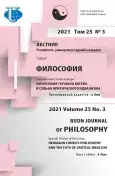The Artistic Representation of Jesus in Hermann Cohen's Aesthetics
- Авторлар: Gamba E.1
-
Мекемелер:
- Theological University of Northern Italy - Turin Campus
- Шығарылым: Том 25, № 3 (2021): HERMANN COHEN'S PHILOSOPHY AND THE FATE OF CRITICAL IDEALISM
- Беттер: 404-419
- Бөлім: HERMANN COHEN'S PHILOSOPHY AND THE FATE OF CRITICAL IDEALISM
- URL: https://journal-vniispk.ru/2313-2302/article/view/325010
- DOI: https://doi.org/10.22363/2313-2302-2021-25-3-404-419
- ID: 325010
Дәйексөз келтіру
Толық мәтін
Аннотация
Cohen deals with the question of the possibility for art to represent God or the divine in some of his works, throughout all his philosophical production, but obviously above all in his main aesthetic work, Ästhetik des reinen Gefühls (1912). We can state that in Cohen's works this problem is posed with reference to three different religious fields: Greek polytheism, Jewish monotheism and Christianity. The topic of this essay will be Cohen's thought about the artistic representation of the divine in Christianity or in Christian art through the representation of Jesus. This topic will be examined with reference both to Kants Begründung der Ästhetik (1889) and to Ästhetik des reinen Gefühls ; whereas in Kants Begründung der Ästhetik Cohen devotes to the representation of Jesus just a short consideration in the historical introduction of the book, in Ästhetik des reinen Gefühls the representation of Jesus is object of far more attention. Here, Cohen's answer to the question of the possibility to represent the divine through the representation of Jesus is that Jesus' divinity, in the artistic representation of his figure, can only have a metaphorical value, the real meaning of which is that Jesus' story is the ideal story of the human being; in Kants Begründung der Ästhetik and in other writings of the 80s, on the contrary, the idea of incarnation and of the divinity of Jesus is object of a different appreciation by Cohen. The comparison between these different stances can be a contribution to the comprehension of the changes in Cohen's view of Christianity through the years.
Негізгі сөздер
Авторлар туралы
Ezio Gamba
Theological University of Northern Italy - Turin Campus
Хат алмасуға жауапты Автор.
Email: ezio.gamba.1975@gmail.com
PhD in Philosophy and Philosophical Hermeneutics, University of Turin; Indentured Professor
83, Via XX Settembre, Turin, 10122, ItalyӘдебиет тізімі
- Cohen H. System der Philosophie. Dritter Teil: Ästhetik des reinen Gefühls. 2 Vols. Berlin: Bruno Cassirer; 1912. Anastatic reprint as Vols. VIII and IX of [2].
- Cohen H. Werke. 17 Vols. (+ 2 Vols. Supplementa). Ed. Hermann-Cohen-Archiv, Hildesheim et al.: Olms; 1977ff.
- Poma A. Yearning for Form and other Essays on Hermann Cohen's Thought. Dordrecht: Springer; 2006.
- Gamba E. La legalità del sentimento puro. L'estetica di Hermann Cohen come modello di una filosofia della cultura. Milano-Udine: Mimesis; 2008.
- Cohen H. Jüdische Schriften. Ed. B. Strauß. 3 Vols. Berlin: C.A. Schwetschke & Sohn; 1924.
- Cohen H. Kants Begründung der Ästhetik. Berlin: Dümmler; 1889. Anastatic reprint as Vol. IV of [2].
- Kluback W. The Idea of Humanity. Hermann Cohen's Legacy to Philosophy and Theology. Lanham et al.: University Press of America; 1987.
- Fischer-Appelt P. Wilhelm Herrmann und Hermann Cohen. Der frühe Diskurs um die Selbstwerdung des Menschen. In: Religion aus den Quellen der Vernunft: Hermann Cohen und das evangelische Christentum. Tübingen: Mohr Siebeck; 2012. P. 116-128.
- Dober HM, Morgenstern M, editors. Religion aus den Quellen der Vernunft: Hermann Cohen und das evangelische Christentum. Tübingen: Mohr Siebeck; 2012.
- Cohen H. Religion der Vernunft aus den Quellen des Judentums. 2nd edition. Ed. B. Strauss, Frankfurt a.M.: Kaufmann; 1929.
- Cohen H. Der Begriff der Religion im System der Philosophie. Gießen: Töpelmann; 1915. Anastatic reprint as Vol. X of [2].
- Poma A. The Critical Philosophy of Hermann Cohen. Engl. transl. J. Denton. Albany NY: SUNY; 1997.
- Wiedebach H. The National Element in Hermann Cohen's Philosophy and Religion. Engl. transl. W. Templer. Leiden-Boston: Brill; 2012.
- Cohen H. Schriften zur Philosophie und Zeitgeschichte. Ed. A. Görland and E. Cassirer. 2 Vols. Berlin: Akademie-Verlag; 1928
Қосымша файлдар









